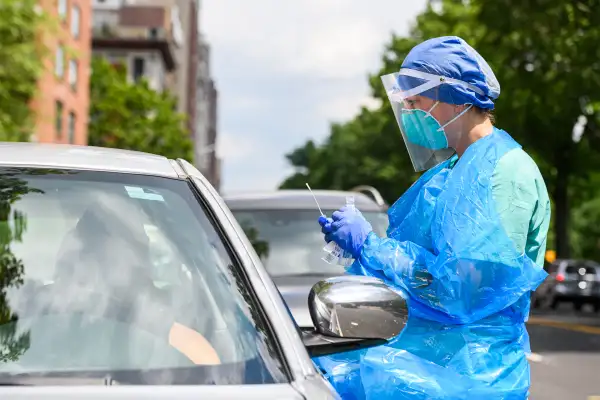COVID Testing Is Supposed to Be Free. So Why Are People Still Getting Huge Bills?

Free, universal coronavirus testing is critical to flattening the arc of infection. But while federal law aims to make such testing easy to access and widely available, those efforts have fallen short for many Americans.
The U.S. healthcare system — chaotic in any "normal" year — is being stretched tissue-paper thin by a flood of coronavirus cases, and squabbling between insurers and legislators about who should pay for that influx isn't making things easier.
So while President Donald Trump has signed multiple orders designed to ensure Americans can get tested for COVID-19 for free, regardless of their insurance coverage, policy loopholes have left numerous ways for patients to get stuck with a bill anyway. (See: The California essential worker who was charged nearly $2,000 for COVID-19 testing, or the woman in Austin, Texas who got a $6,000 bill, according to NPR and the New York Times, respectively.)
Here's everything we know about how much coronavirus tests actually cost — and why some people are having to pay thousands of dollars out of pocket.
[Note: The type of testing referenced throughout this story refers to the COVID-19 diagnostic test, not the antibody test. A complete guide to the where to buy coronavirus antibody tests and how much they cost can be found here.]
How much is a COVID-19 test SUPPOSED to cost?
Prices for coronavirus testing aren't federally regulated, according to a report from The Peterson Center on Healthcare and the Kaiser Family Foundation (Peterson-KFF). Like other types of medical fees, insurance companies have to negotiate the cost with the providers and labs that dole out the tests.
The CARES Act requires hospitals and other medical providers to disclose the "cash price" of COVID-19 tests on their websites, which, in theory, could help could people looking to take the test know exactly how much money they'll be out if they end up having to pay for it on their own. But not all medical providers are following that CARES Act rule — and those that are publicly posting coronavirus test prices are disclosing costs ranging anywhere from $20 to $850 per test, according to the Peterson-KFF report. That's quite a spectrum, and it doesn't include fees for other services that may be required, like doctor's visit charges, specimen collection, or other types of diagnostic testing.
How to get free COVID testing
Insurers are legally required to pay for in-network testing, so try to find a medical facility where you know you'll be covered. Many insurers have also agreed to cover the cost of a COVID test if it's done at an out-of-network facility, but you'll want to reach out to your insurance company (or Medicare/Medicaid provider) before your visit.
As of this writing, the government is reimbursing medical providers that give coronavirus tests and treatment to uninsured Americans, as long as certain qualifications are met. So as long as you have a social security number and a state I.D., you should be able to get a test for free — or for a nominal fee — even if you don't have insurance.
Here's where it gets tricky. Insurers aren't required to pay for fees incurred by patients who seek a COVID-19 test but don't actually GET the test. So if a doctor decides not to test you for the virus, or the facility has run out of tests completely, you could still be on the hook for whatever fees you happen to rack up during your visit — from a strep test to a five-night hospital stay.
The rules for out-of-network coverage are even more muddled, which can be particularly burdensome for people living in rural and low-income pockets of the country where medical providers are few and far between.
"Such charges ... can be financially burdensome or prohibitive for uninsured or self-pay patients, especially given the current labor market and high rates of unemployment," the KFF report says.
Where to get a coronavirus test
Your state and local health department websites should have a list of the hospitals, clinics, and "drive-thru" screening facilities offering COVID-19 tests in your area, according to the CDC.
Many doctors and medical centers are scheduling telehealth appointments over video prior to administering the test in-person, so make sure you know what the procedure is before trying to get a walk-in appointment (you might get turned away if you just show up). Pharmacies like CVS and Walgreens are also operating pop-up testing sites — appointments for those facilities can be booked online.
More from Money:
The Definitive Guide to Antibody Tests: What They Do, Where to Get Them, and How Much They Cost
How the GOP's New Stimulus Plan Would Make it Harder for the Jobless to Make Ends Meet
How to Protect Your Credit Score During the Coronavirus Crisis

